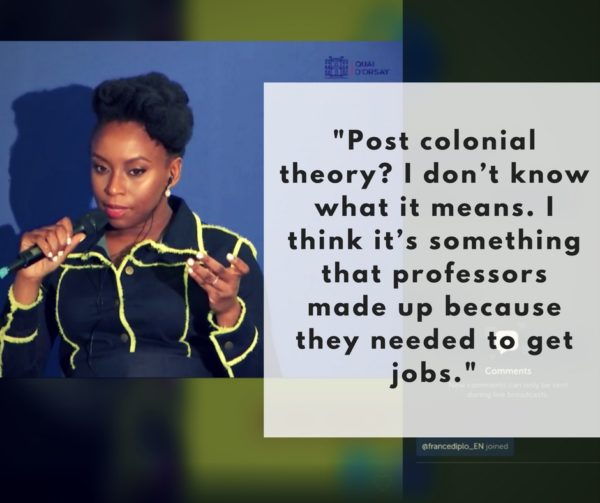
Last week, during her 25 January The Night of Ideas interview in France, Chimamanda Ngozi Adichie sparked controversy with her comments on post-colonial theory. When asked her thoughts on it, she said:
Post-colonial theory? I don’t know what it means. I think it’s something that professors made up because they needed to get jobs.
On Twitter, Kenyan poet Shailja Patel, author of Migritude, sent out fourteen tweets reiterating the importance of post-colonial theory.
Read them below.

Here’s why it’s helpful to believe in post colonial theory. Because then your answer to “Does Nigeria have libraries?” might be, “Yes, but they lack books and journals because the World Bank and IMF forced Nigeria to de-fund public education.” https://t.co/8hEuEWvgmP
— Shailja Patel (@shailjapatel) January 27, 2018
I wonder what Chimamanda would answer if asked “Do they have thinkers and scholars in Nigeria?” given her relentlessly contemptous dismissal of generations of African thinking and scholarship.
— Shailja Patel (@shailjapatel) January 27, 2018
I wonder what Chimamanda would answer if asked “Do they have thinkers and scholars in Nigeria?” given her relentlessly contemptous dismissal of generations of African thinking and scholarship.
— Shailja Patel (@shailjapatel) January 27, 2018
Cognitive dissonance is demanding that African countries and cultures be granted parity of complexity and modernity with Western countries and cultures, while simultaneously trashing African thinking, sexual diversity, and knowledge production.
— Shailja Patel (@shailjapatel) January 27, 2018
When you’re a global thought leader whose every eminently quotable clapback makes headlines, but you erase whole bodies of African knowledge and African feminism outside your field, what Africa are you defending? A market? A brand?
— Shailja Patel (@shailjapatel) January 27, 2018
The agenda of Brand Africa on global stages is often antithetical to lived realities and struggles against structural oppression within African countries. That’s why we need theory, history, data, and analysis. Generations before us fought and died in liberation wars for this.
— Shailja Patel (@shailjapatel) January 27, 2018
I’m thinking of ongoing struggles in South Africa for Black children to access schooling that doesn’t dehumanize them. Of #FeesMustFall. Of Kenyan police waging daily war on marginalized communities. Of Laikipia land wars. Of borders, resource plunder, slave markets. And this. pic.twitter.com/qqzAahmtOz
— Shailja Patel (@shailjapatel) January 27, 2018
The irony is that Chimamanda’s parents are both academics. Her mother was the University of Nigeria’s first woman registrar – the ‘academic feminism’ she sneers at. Chimamanda grew up on a university campus. Are we to believe this had nothing to do with her access to books?
— Shailja Patel (@shailjapatel) January 27, 2018
That post colonial theory Chimamanda derides as ‘made up’? Is what got books by African writers on the national curricula in African countries. So she can say, calmly, “my books are read in schools in Nigeria, and across Africa.”
— Shailja Patel (@shailjapatel) January 27, 2018
Who put Purple Hibiscus on college reading lists and syllabi, catapulting the first novel of an unknown Nigerian writer to critical and commercial success? Academic feminists, versed in post colonial theory.
— Shailja Patel (@shailjapatel) January 27, 2018
Who fought to have women and Black people admitted at Princeton, Yale, Harvard, where Chimamanda enjoyed fellowships? Academic feminists and post colonial theorists.
— Shailja Patel (@shailjapatel) January 27, 2018
Chimamanda the novelist is a genius. Her accomplishments are stellar, her fame merited. But the recognition and rewarding of her gifts wasn’t a happy accident. The labours and struggles of many scholars, past and present, carved out the spaces where her voice could land.
— Shailja Patel (@shailjapatel) January 27, 2018
And so Chimamanda’s repeatedly expressed contempt for intellectual labour and knowledge production – African, feminist, queer – is both dangerous and painful.
— Shailja Patel (@shailjapatel) January 27, 2018
Dangerous because it erases the histories that made her success possible.
Painful because it smacks of knocking down the ladders that she climbed up on, so they’re not available to others who come after her.
— Shailja Patel (@shailjapatel) January 27, 2018








2018 Brittle Paper Awards: Winners Announced – ACEworld (Publishers & Magazine) November 03, 2019 02:11
[…] Brittle Paper Anniversary Award ($300): “On Postcolonial Theory” by Shailja […]